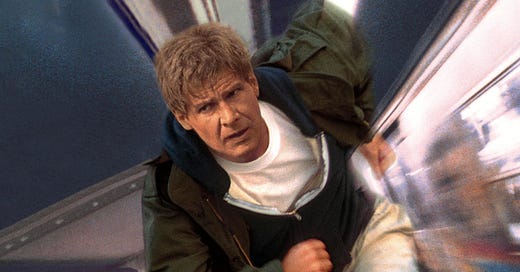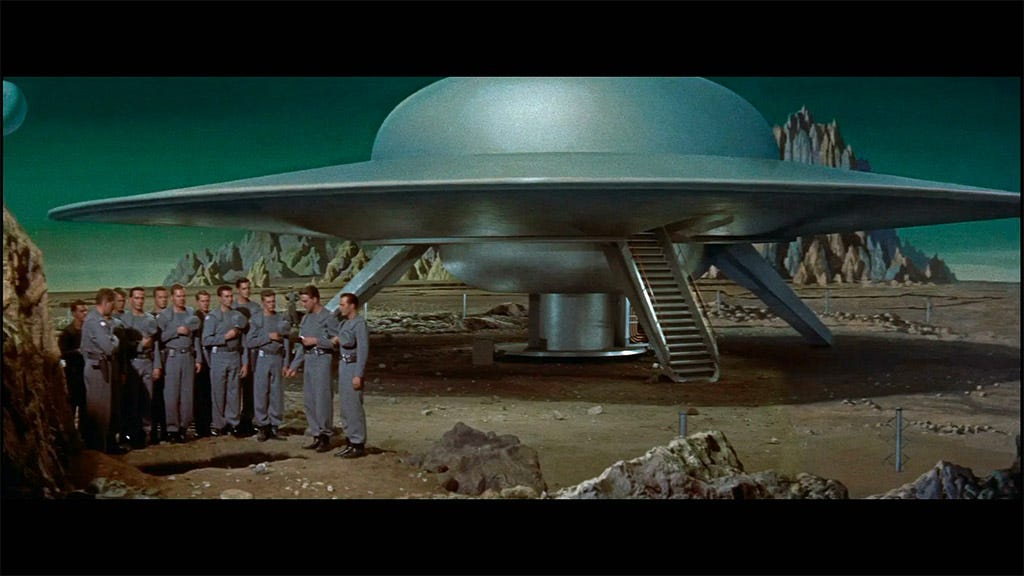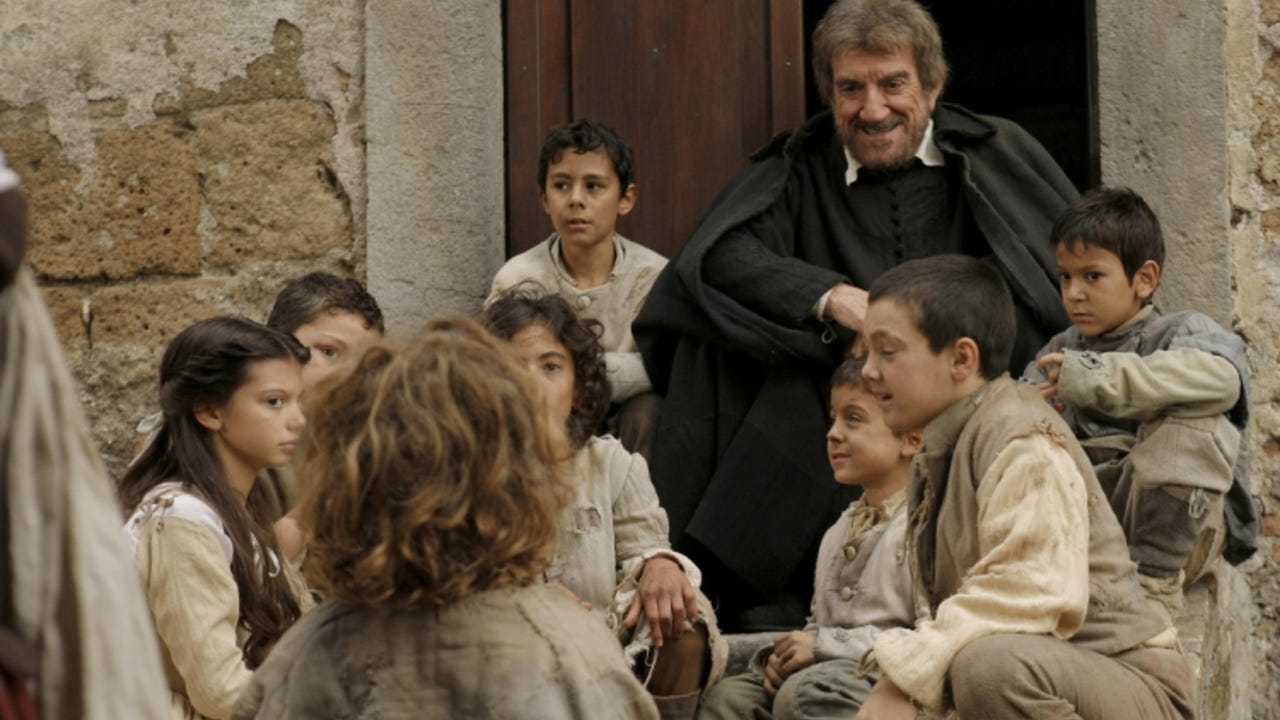Weekly Watches: April 17, 2024
Sharing Our Recent Discoveries: Weekly Watches with 100 Movies Every Catholic Should See
The Fugitive (1993)
Directed by Andrew Davis, Starring Harrison Ford
By
The Fugitive objectively represents the best in the genre. Emotional spectacle plus mystery-solving montages with a sprinkle of a Harrison Ford masterclass in “silent film acting” is a recipe for a timeless masterpiece. The film expertly weaves together outstanding technical and tight story-telling expertise set in the director Andrew Davis’s hometown of Chicago. Upon revisiting this myself during a weekly watch, two things made this movie so engaging :
Firstly, Richard Kimble's profession. As a doctor, he knows how to treat his own wounds under pressure, tip off medical help to other doctors on his foe's injuries, and correct a misdiagnosis on a child during a crucial scene where his mission hangs in the balance, all while racing against time trying to prove his innocence. Audiences (especially me) like characters who are good at their jobs. Secondly, our antagonist, Sam Gerard is just so dang likable and equally good at his job. While Gerard is determined, powerful and a real threat, he is in no way a bad person at heart. This creates refreshing tension wrapped up in an action movie about integrity. Subjectively, there is still lots to pick up and love about this film with every viewing after all these years.
Forbidden Planet (1956)
Directed by Fred M. Wilcox, Starring Walter Pidgeon, Anne Francis
By
Forbidden Planet walked so Star Trek, Star Wars and pretty much our entire concept of cinematic science fiction could run. The film is absolutely groundbreaking, from being the first ever to be set on another planet, to a depiction of a robot with human characteristics to introducing the concept of a faster than light spacecraft. The visual effects and production design are exquisite, a seeming blend of the collective imagination of the 1950s sci-fi era, from futuristic, zanily colored interiors to gorgeous extrasolar backdrops with vivid hues and ringed planets. Amidst the arresting and vivid visuals, the film threw about some surprisingly weighty ideas, instantly elevating it past the b-movie sentiment you may have gotten from the poster.
Drawing inspiration from Shakespeare’s The Tempest, the film follows a starship crew searching for a lost expedition from earth on the distant planet Altair IV. Surprisingly, the film plays out more like a mystery over the first two acts, setting up some rather interesting ideas for a suspenseful climax. Freudian Ids and egos dance about amidst an unsettling electronic soundscape, giving a visually engaging affair some intellectual heft. If you can look past a few hokey elements that come with the territory, Forbidden Planet is loads of fun and an interesting watch for those looking to see the origins of our concept of science fiction in film.
The Hobbit: An Unexpected Journey (2012)
Directed by Peter Jackson, Starring Martin Freeman and Ian McKellen
By Josh Wilson
The greatest part about this movie is that feeling that you get simply from returning to Peter Jackson's Middle Earth. The return to the Shire, Hobbiton, Bag End and Rivendell is almost nostalgic in a sense. Throughout the movie you see Ian McKellen, Ian Holm, Hugo Weaving, Kate Blanchett, Christopher Lee, and Andy Serkis' Gollum, and you get that feeling that you had been longing for, to be back in Middle Earth. The essential and memorable parts of the book that you had been longing to see on the screen, such as the riddle battle between Bilbo and Gollum, and the dwarfs arrival and singing of “misty mountains” at Bag End are included and do not disappoint.
Although much can be said about the disappointment of the Hobbit trilogy as a whole, most of the blanket arguments against the Hobbit trilogy cannot be applied to this movie. While the same cannot be said for the flowing two movies, Bilbo is a large focus of this movie and his character is the main focus, (the trilogy is named after him after all.) Stuffed and bogged down by subplots and side characters, the next two movies in the franchise forget who the main character is, and practically reduce Bilbo to a supporting character in his own movie. But that is not the case in this movie, as Bilbo gets his due as the lead character while the other characters stories, especially those of Gandalf and Thorin, get their time and place as supporting story arcs. Since this movie does indeed focus on ‘the hobbit’ and sticks to the source material, it is an outlier in the franchise, and the simplicity and wholesomeness of this first movie cannot be overlooked.
St. Philip Neri: I Prefer Heaven (2010)
Directed by Giacomo Campiotti
By
If you disliked Cabrini’s lack of spiritual reality, you’ll prefer I Prefer Heaven. The two TV films each illustrate a stage in Neri’s life like the panel of a diptych, enriching their counterpart and capturing the fecundity of suffering in a truly Catholic way. Gigi Proietti’s guileless performance as the Roman Saint reminds us of the gospel’s joy amidst pain and uncertainty. I Prefer Heaven is two low-budget TV films combined (just shy of four hours, total), so come in with low-budget TV film expectations and break it up over two viewings. 8/10. Definitely worth a watch.
















I love Peter Jackson's adaptation of The Lord of the Rings trilogy, but I was skeptical when I heard they were making two movies out of The Hobbit. After they announced it would be another trilogy, I lost interest. I finally got around to watching them recently. I, too, rather liked the first film, even though it didn't touch the previous movies. I still liked the second and third parts but not that much. My suspicions were confirmed that they should have widdled those two down to one and I think it would have been better.